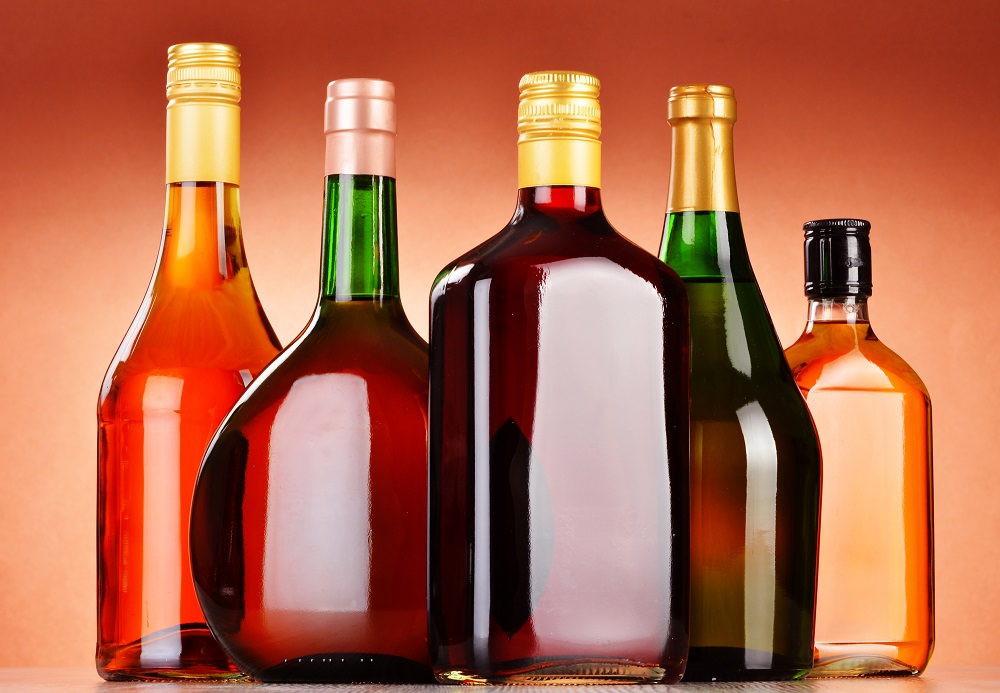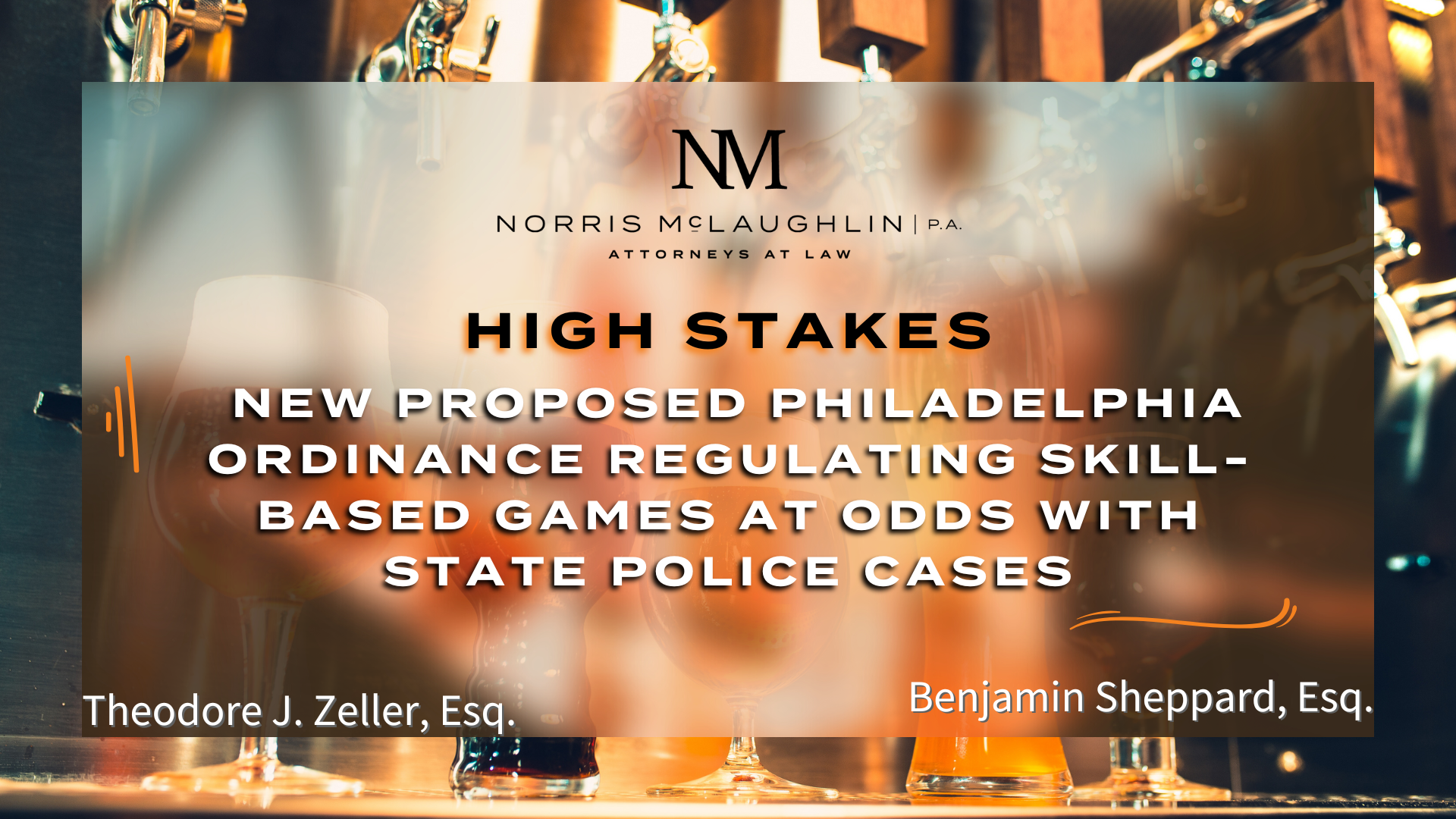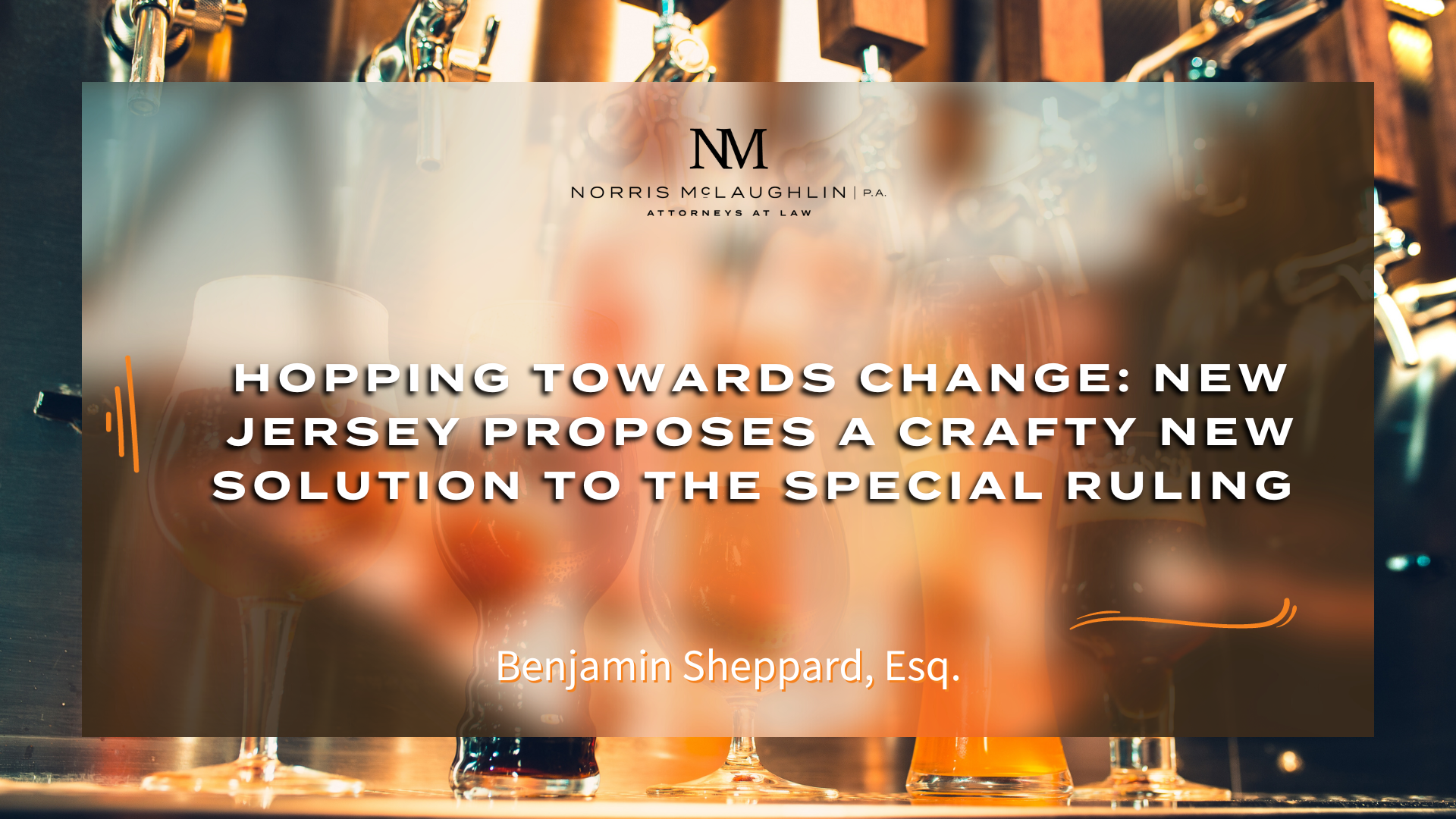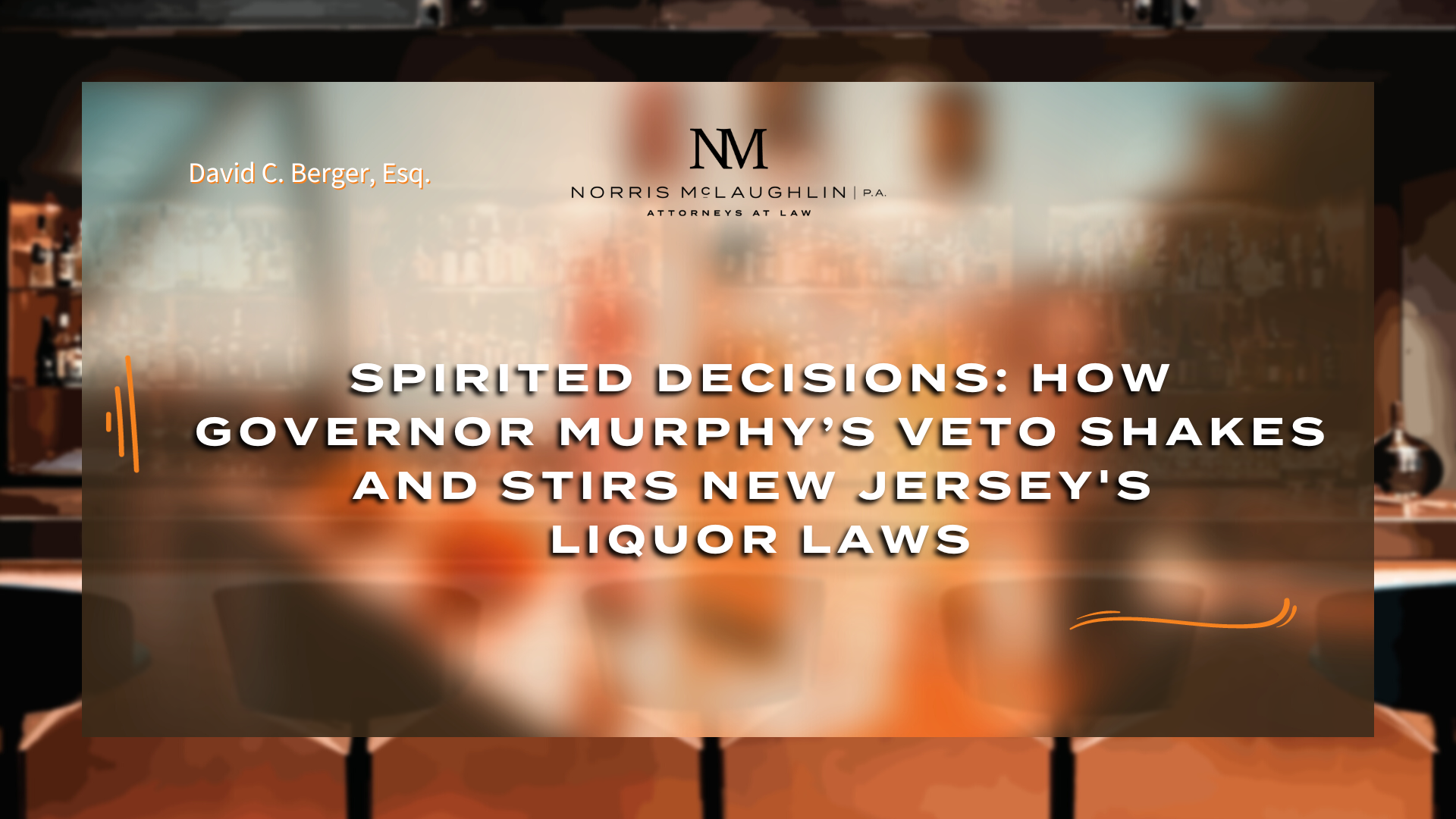Pennsylvania Liquor Law Update: Acts 45, 48, and 57 Make Changes to Cider, Sound, Local Option, Nonalcoholic Malt or Brewed Beverages, and More

Recent history has taught liquor licensees and their attorneys to not get comfortable with current liquor law or regulation for too long without expecting change. As of August 31, 2019, Acts 45, 48, and 57 of 2019 brought more changes to the Pennsylvania Liquor Code.
This post is a general overview of these changes. Feel free to reach out with any specific questions.
Alcoholic Cider and Fermented Fruit Beverage
Act 45 of 2019 amended the Liquor Code definition of “Alcoholic Cider” to remove the language that permits the source of the product to come from “any fruit or fruit juice.” The definition of “Alcoholic Cider” has now been limited to only include products derived from apples, apple juice concentrate and water, pears, or pear juice concentrate and water. This is more in-line with the federal definition, which considers these products apple wine or pear wine.
There is still a way to make cider-like drinks from other fruits. Act 45 of 2019 added a definition for “Fermented Fruit Beverages” to the Liquor Code, which is essentially a new category of beverage that applies to licensees the same way as Alcoholic Cider. The definition of Fermented Fruit Beverages is almost identical to Alcoholic Cider, except that the products can be derived from “fruit, fruit juice, fruit juice concentrate and water with or without flavorings.” The PLCB recently released an advisory opinion stating that products with 10% or less non-apple or non-pear juice would be considered an Alcoholic Cider. The alcohol by volume can be anywhere between 0.5% to 8.5%, just like Alcoholic Cider. Similarly, it is categorized as a “Malt or Brewed Beverage” and cannot be marketed as wine. This means the products, whether Alcoholic Cider or Fermented Fruit Beverages, are a saleable item for distributors, beer wholesalers, and retail take-out sales.
Although it can be produced by a Brewery licensee in any quantity, a Limited Winery licensee must include the production of Fermented Fruit Beverages in its maximum of 200,000 gallons per year of production of Alcoholic Ciders, Mead, Wine, and Wine Coolers.
Limited Wineries and Amplified Sound
Generally, the Liquor Code prohibits any licensee from using a loudspeaker or similar amplified device from amplifying sounds from inside or outside the licensed premises beyond the licensee’s property line. Act 45 added an exception for Limited Winery licensees, whereby Limited Winery licensees located in Class 2A through Class 8 counties, which is every county except Philadelphia or Allegheny, can have amplified sound as long as the sound does not exceed 75 decibels beyond the limited winery’s property line. However, this exception does have a time restriction, whereby it only applies from 10:00 AM to 8:00 PM on Sunday through Thursday and 10:00 AM-10:00 PM on Friday and Saturday. Good luck trying to rationalize the basis for this new law and why it was specially made for Limited Wineries. Special interest legislation continues to obfuscate the Liquor Code and makes different sets of rules for different stakeholders.
Local Option Adds Manufacturing
Under the Liquor Code, municipalities can choose, by a vote of its citizens, to become a “dry municipality” that does not permit the sale of alcohol by certain licensees. Prior to Act 48 of 2019, municipalities could not prohibit manufacturing licensees, such as breweries, wineries or distilleries, from opening locations or obtaining licenses from the Pennsylvania Liquor Control Board in their municipalities. Act 48 now permits municipalities to include ballot initiatives to exempt Brewery, Brewery Storage, Limited Distillery, Limited Distillery Satellite Locations, Limited Winery, and Limited Winery Satellite Locations. Any of the above-referenced licensees that previously obtained licenses prior to Act 48 will be grandfathered in, and the full exemption will not take place until the citizens of the municipality affirmatively vote to prohibit such licensees.
Nonalcoholic Malt or Brewed Beverages
Prior to Act 45, the Liquor Code did not even address nonalcoholic malt or brewed beverages. Act 45 changed that. Now, “Nonalcoholic Malt or Brewed Beverage” is specifically defined in Section 431 of the Liquor Code, which addresses the privileges of Distributor and Importing Distributor licenses, as “any beverage intended to be marketed or sold as nonalcoholic beer having at least a trace amount of alcohol content but which does not contain one-half per centum (0.5%) or more alcohol by volume.” In addition to adding the definition, all nonalcoholic malt or brewed beverages produced, which are produced at an out-of-state brewery or a Pennsylvania brewery that has granted territorial rights to a Pennsylvania importing distributor, must be distributed by an importing distributor licensee, even though it does not meet the definition of a “Malt or Brewed Beverage” in the Liquor Code. This is a curious change to the Liquor Code, especially since it is not an alcoholic beverage by almost every other definition in the Liquor Code, but my assumption is that it is due to the increase of nonalcoholic beer in the marketplace and no clear distinction on who could sell it.
Limited Winery Records
Act 45 removed the requirement for Limited Winery licensees to provide a sales invoice for purchased made by private individuals at the limited winery’s locations. This does not apply to transactions that are in excess of 16 liters in a single transaction.
Tourist Development Projects
Act 57 of 2019 created a definition for “Tourist Development Project.” A Tourist Development Project is defined as “a planned development situated on at least ninety acres of land, constructed since January 1, 2019, that is dedicated primarily to tourism with at least five hundred thousand square feet of actual or proposed development, with a mix of entertainment and retail uses.” It must be located in a municipality that permits the issuance and transfer of liquor licenses. The major change in Act 57 is that up to 75 restaurant licenses can be transferred into a Tourist Development Project, and can be obtained from the Liquor License Auctions or licenses from a “saturated county” (which is defined as “a county with more than one restaurant liquor license per 3,000 inhabitants in the top 25 highest ratios of restaurant liquor licenses to county population in the Commonwealth”). The application fee is $1,000,000, with an additional surcharge of $65,000 per license requested. Those fees would be in addition to whatever price is charged by the licensee selling the liquor license. This is change is a complete mess and another piece of special interest legislation for development in the Pocono region.
Wine and Spirit Auction Permits
Act 45 amended the Liquor Code to permit donations of wine or spirits by anyone who has legally acquired the wine or spirits and who legally possess the wine or spirits in Pennsylvania. This now permits licensees and permittees to donate wine or spirits.
For information regarding national and state liquor law matters or general manufacturing and distribution advice, please contact our Liquor Law, Licensing, Manufacturing, and Distribution Practice Group: Liquor Law Department Chair Theodore J. Zeller III, Esquire (tzeller@norris-law.com); David C. Berger, Esquire (dberger@norris-law.com) for Pennsylvania and New Jersey retail and manufacturing licensing; or contact our offices at 610-391-1800.



